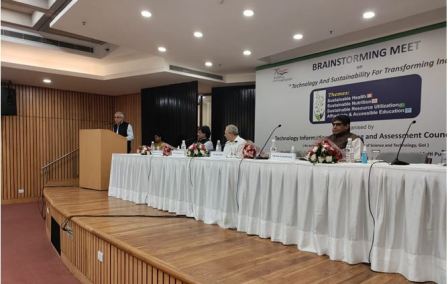Experts Brainstorm on Future Technologies for India
The two-day brainstorming focused on four aspects: `sustainable health’, `sustainable nutrition’, `sustainable resource utilisation’, and `affordable and accessible education’.
Vice-Chairman of NITI Aayog, Dr Rajiv Kumar, has emphasised the need for devising innovative and effective schemes and programmes to attract back to India bright brains that are presently working overseas and for efforts to ensure that scientists and technologists worked in a collaborative manner overcoming the fragmented silos approach.
effective schemes and programmes to attract back to India bright brains that are presently working overseas and for efforts to ensure that scientists and technologists worked in a collaborative manner overcoming the fragmented silos approach.
He was speaking at a brainstorming meeting organised by the Ministry of Science and Technology’s, Technology Information, Forecasting, and Assessment Council (TIFAC) on `technology and sustainability for transforming India’ as part of an exercise to prepare a vision document for 2047, which will be the centenary year of India’s Independence.
He urged that the future vision exercise looks into the needs and goals of growth and sustainability through the concept of a resource-light economy where every aspect of technology development is derived from the optimal utilisation of resources.
He called for a focus on promoting integrative medicine with equal emphasis on different systems of medicine based on scientific evidence, and on ensuring better early childhood health covering children between one and four, so that there could be sustainable health, nutrition, and education.
In addition, he stressed that resource optimisation in terms of climate change can be possible by putting Carbon back into the soil. In this context, he called for greater encouragement and support for organic farming.
He also emphasized that apart from the vision statement, the new document may specify measures required to realise each of the targets and recommendations, with clear-cut time frames, and measurable outcomes and milestones.
The two-day brainstorming focused on four aspects: `sustainable health’, `sustainable nutrition, `sustainable resource utilisation’, and `affordable and accessible education.
TIFAC Chairman, Devang Khakhar, and Executive Director, Prof. Pradeep Srivastava, recalled that the organization, which was set up in 1986 with a mandate to continuously assess the state-of-art of technology and set directions for future technological development in India in important socio-economic sectors, has been carrying out technology foresight exercises, facilitating and supporting technology development, preparing technology linked business opportunity reports and implementing mission-mode programmes.
The panellists at the conference include subject experts from both government institutions and private organisations. (India Science Wire)
